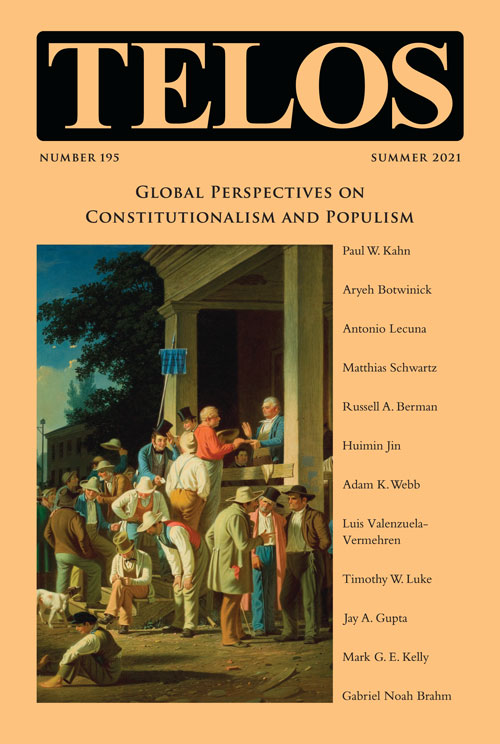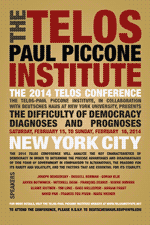By Telos Press · Monday, July 5, 2021 In today’s episode of the Telos Press Podcast, David Pan talks with Antonio Lecuna about his article “Populism in Venezuela: The Nature of Chavismo,” from Telos 195 (Summer 2021). An excerpt of the article appears here. If your university has an online subscription to Telos, you can read the full article at the Telos Online website. For non-subscribers, learn how your university can begin a subscription to Telos at our library recommendation page. Print copies of Telos 195 are available for purchase in our online store.
Listen to the podcast here.
Continue reading →
By David Pan · Friday, June 18, 2021 Telos 195 (Summer 2021): Global Perspectives on Constitutionalism and Populism is now available for purchase in our store. Individual subscriptions to Telos are also available in both print and online formats.
 After watching the images of the January 6 Capitol riot, many Americans concluded that right-wing populism threatens the basic rules of our constitutional order. In this view, the U.S. Constitution establishes a universal order that is detached from any particular orientation and provides the neutral ground upon which differences can be discussed, while populists upset the rules of discussion and destroy the basis of a common project. Consequently, since populism is at odds with the Constitution, the solution would be to try to reimpose a measure of rationality upon the unruly. Yet the nagging concern behind this perspective is not just the violation of rules but the suspicion that populism is ultimately motivated by racism and sexism. In this case, the real opposition would not be between constitutionalism and populism but between two understandings of the Constitution, that is, two conceptions of the character of the people, one egalitarian and the other racist. The difficulty is that the laws of a constitution cannot exist independently of a people with a specific history. Rules cannot be neutral but imply a perspective on the world, and the conflict between constitutionalism and populism may in fact be a symptom of a conflict between two factions within the people, each of which is attempting to establish itself as the proper representation of the will of the people as a whole. After watching the images of the January 6 Capitol riot, many Americans concluded that right-wing populism threatens the basic rules of our constitutional order. In this view, the U.S. Constitution establishes a universal order that is detached from any particular orientation and provides the neutral ground upon which differences can be discussed, while populists upset the rules of discussion and destroy the basis of a common project. Consequently, since populism is at odds with the Constitution, the solution would be to try to reimpose a measure of rationality upon the unruly. Yet the nagging concern behind this perspective is not just the violation of rules but the suspicion that populism is ultimately motivated by racism and sexism. In this case, the real opposition would not be between constitutionalism and populism but between two understandings of the Constitution, that is, two conceptions of the character of the people, one egalitarian and the other racist. The difficulty is that the laws of a constitution cannot exist independently of a people with a specific history. Rules cannot be neutral but imply a perspective on the world, and the conflict between constitutionalism and populism may in fact be a symptom of a conflict between two factions within the people, each of which is attempting to establish itself as the proper representation of the will of the people as a whole.
Continue reading →
By Carlos Gasperi · Friday, May 9, 2014 The following paper was presented at the Eighth Annual Telos Conference, held on February 15–16, 2014, in New York City.
 In the following, I address the question of Venezuelan democracy under the fourteen-year mandate of recently deceased President Hugo Chávez from the philosophical perspective of Karl Marx’s The Eighteenth Brumaire to Louis Bonaparte. Recent Latin American history of the past twenty years has seen a resurgence of leftist governments sympathetic to Cuba’s Marxist revolutionary ideals of the 1960s, where Venezuela is no exception. Focusing on one particular event in Venezuela’s contemporary history, I wish to accomplish two things. The first is to convince my audience that Nicolás Maduro’s inauguration ceremony of his then newly appointed presidential cabinet in late-April 2013 is the sharpest expression of the current failed state and non-direction of Chavismo in Venezuela, or more precisely, what I call the dissolution of its sensus communis. Second, I wish to advance a philosophical question for discussion among audience members, namely, does replicating a historically prior political ideology ever secure success for democracy within present historical circumstances; more succinctly, in other words, do anachronistic political experiments produce volatile democracies? In the following, I address the question of Venezuelan democracy under the fourteen-year mandate of recently deceased President Hugo Chávez from the philosophical perspective of Karl Marx’s The Eighteenth Brumaire to Louis Bonaparte. Recent Latin American history of the past twenty years has seen a resurgence of leftist governments sympathetic to Cuba’s Marxist revolutionary ideals of the 1960s, where Venezuela is no exception. Focusing on one particular event in Venezuela’s contemporary history, I wish to accomplish two things. The first is to convince my audience that Nicolás Maduro’s inauguration ceremony of his then newly appointed presidential cabinet in late-April 2013 is the sharpest expression of the current failed state and non-direction of Chavismo in Venezuela, or more precisely, what I call the dissolution of its sensus communis. Second, I wish to advance a philosophical question for discussion among audience members, namely, does replicating a historically prior political ideology ever secure success for democracy within present historical circumstances; more succinctly, in other words, do anachronistic political experiments produce volatile democracies?
Continue reading →
|
|

 In the following, I address the question of Venezuelan democracy under the fourteen-year mandate of recently deceased President Hugo Chávez from the philosophical perspective of Karl Marx’s The Eighteenth Brumaire to Louis Bonaparte. Recent Latin American history of the past twenty years has seen a resurgence of leftist governments sympathetic to Cuba’s Marxist revolutionary ideals of the 1960s, where Venezuela is no exception. Focusing on one particular event in Venezuela’s contemporary history, I wish to accomplish two things. The first is to convince my audience that Nicolás Maduro’s inauguration ceremony of his then newly appointed presidential cabinet in late-April 2013 is the sharpest expression of the current failed state and non-direction of Chavismo in Venezuela, or more precisely, what I call the dissolution of its sensus communis. Second, I wish to advance a philosophical question for discussion among audience members, namely, does replicating a historically prior political ideology ever secure success for democracy within present historical circumstances; more succinctly, in other words, do anachronistic political experiments produce volatile democracies?
In the following, I address the question of Venezuelan democracy under the fourteen-year mandate of recently deceased President Hugo Chávez from the philosophical perspective of Karl Marx’s The Eighteenth Brumaire to Louis Bonaparte. Recent Latin American history of the past twenty years has seen a resurgence of leftist governments sympathetic to Cuba’s Marxist revolutionary ideals of the 1960s, where Venezuela is no exception. Focusing on one particular event in Venezuela’s contemporary history, I wish to accomplish two things. The first is to convince my audience that Nicolás Maduro’s inauguration ceremony of his then newly appointed presidential cabinet in late-April 2013 is the sharpest expression of the current failed state and non-direction of Chavismo in Venezuela, or more precisely, what I call the dissolution of its sensus communis. Second, I wish to advance a philosophical question for discussion among audience members, namely, does replicating a historically prior political ideology ever secure success for democracy within present historical circumstances; more succinctly, in other words, do anachronistic political experiments produce volatile democracies? 

